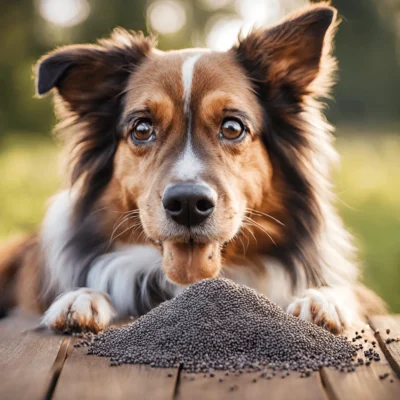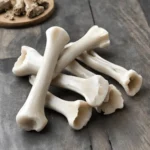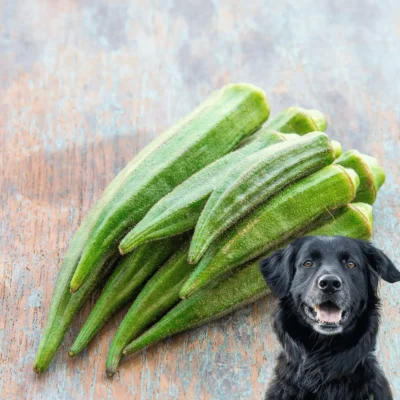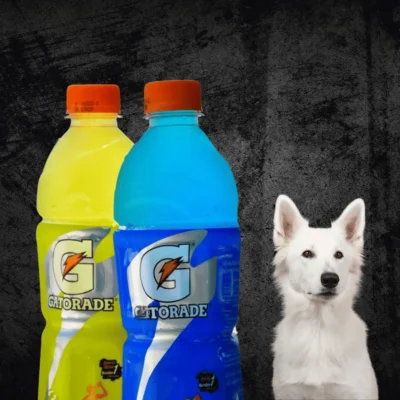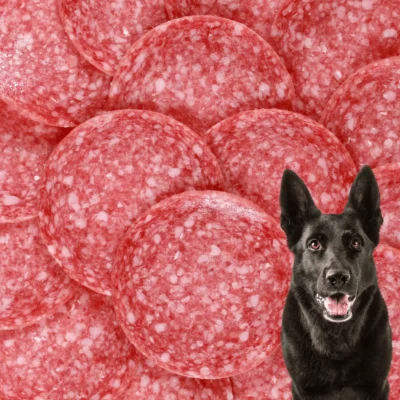When the term “chia” is mentioned, for many, the immediate association is with the iconic “Chia Pet.” However, in recent times, chia has gained widespread popularity as a nutritious “superfood” for humans, particularly as a foundation for healthy puddings. But what about chia seeds for dogs? Can dogs enjoy this nutrient-packed food? The answer is yes; this healing food is safe for canine consumption. However, there are important recommendations to ensure the safe inclusion of chia seeds in a dog’s diet.
In this article, we delve into whether dogs can eat chia seeds. We will discuss the benefits and hazards associated with this nutrient-dense food. Additionally, we will explore the best ways to incorporate them into a dog’s diet.
Here are the topics we’re going to discuss in this blog post:
- What are chia seeds?
- Can dogs eat chia seeds?
- 5 benefits of chia seeds dogs
- Are chia seeds bad for dogs?
- How do you safely give chia seeds to your dog?
- How much chia seeds can a dog have?
- Before sharing with your pooch
What are Chia Seeds?
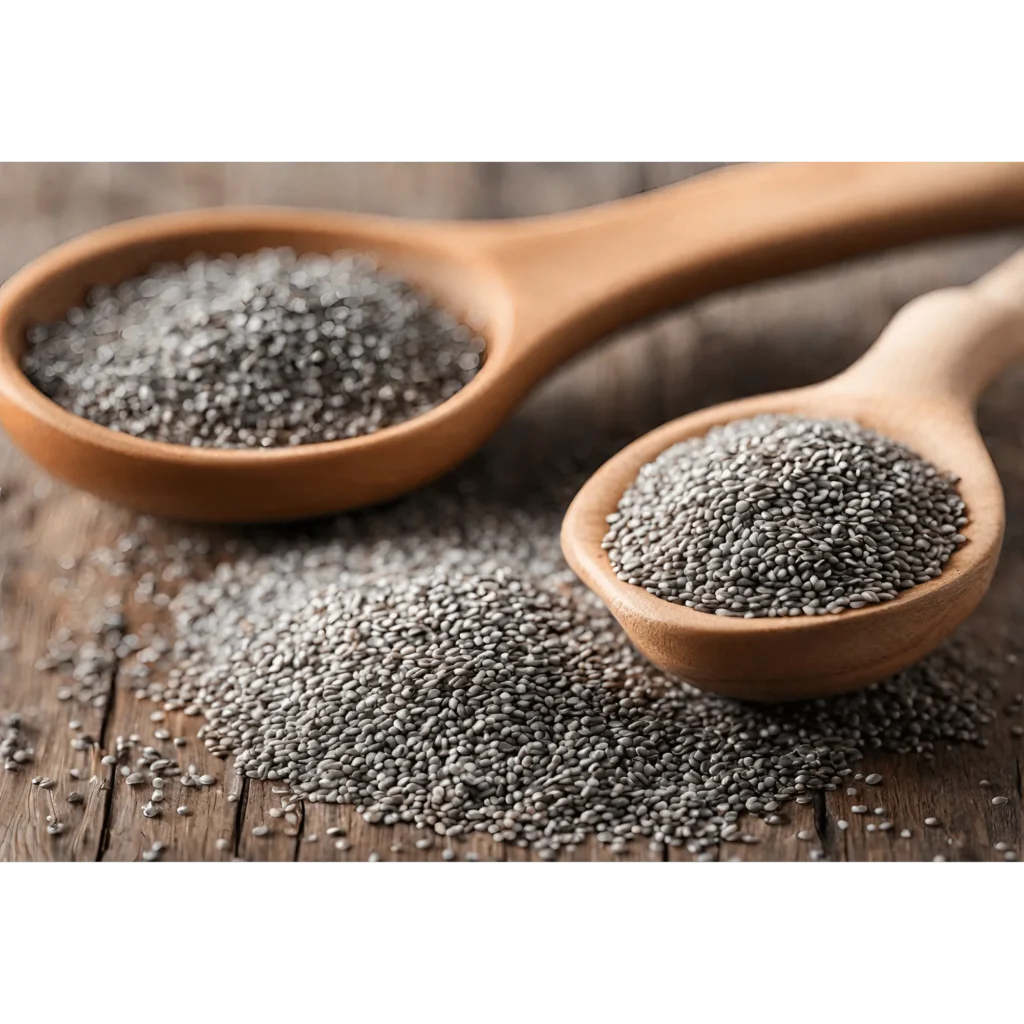
Chia seeds are small, nutrient-dense seeds derived from the Salvia hispanica plant, a member of the mint family. Native to Central and South America, chia seeds have been a staple in the diets of ancient civilizations like the Aztecs and Mayans. These little seeds, available in black, brown, gray, or white, measure about two millimeters in diameter. What makes them stand out is their remarkable ability to absorb about ten times their weight in liquid, making them a versatile ingredient for cooking and baking.
In ancient times, Mesoamerican cultures turned to chia seeds to boost their energy levels, and today, these seeds continue to garner praise for their numerous health benefits. Not only do they promote heart health, but their high fiber content aids digestion, and they serve as a valuable plant-based source of omega-3 fatty acids. Versatile and rich in nutritional value, salba chia has seamlessly transitioned from ancient traditions to modern kitchens, enhancing a variety of dishes with its healthful qualities.
Can Dogs Eat Chia Seeds?
Yes, chia seeds are safe for dogs in moderation. Chia seeds offer some nutritional benefits, including omega-3 fatty acids and fiber. However, it’s essential to introduce them gradually and in small amounts, especially if your dog hasn’t had them before.
If you decide to feed your dog chia seeds, it’s advisable to soak them in water before offering them to your pet. This helps prevent the seeds from expanding too much in the dog’s stomach, reducing the risk of gastrointestinal issues.
Before adding any new food to your dog’s diet, it’s recommended to consult with your veterinarian. Dogs have different dietary needs, and individual dogs may have allergies or sensitivities to certain foods. Additionally, too many chia seeds could potentially cause digestive upset in some dogs. Always monitor your dog for any adverse reactions and make adjustments to their diet as needed based on your veterinarian’s guidance.
5 Benefits of Chia Seed Dogs:
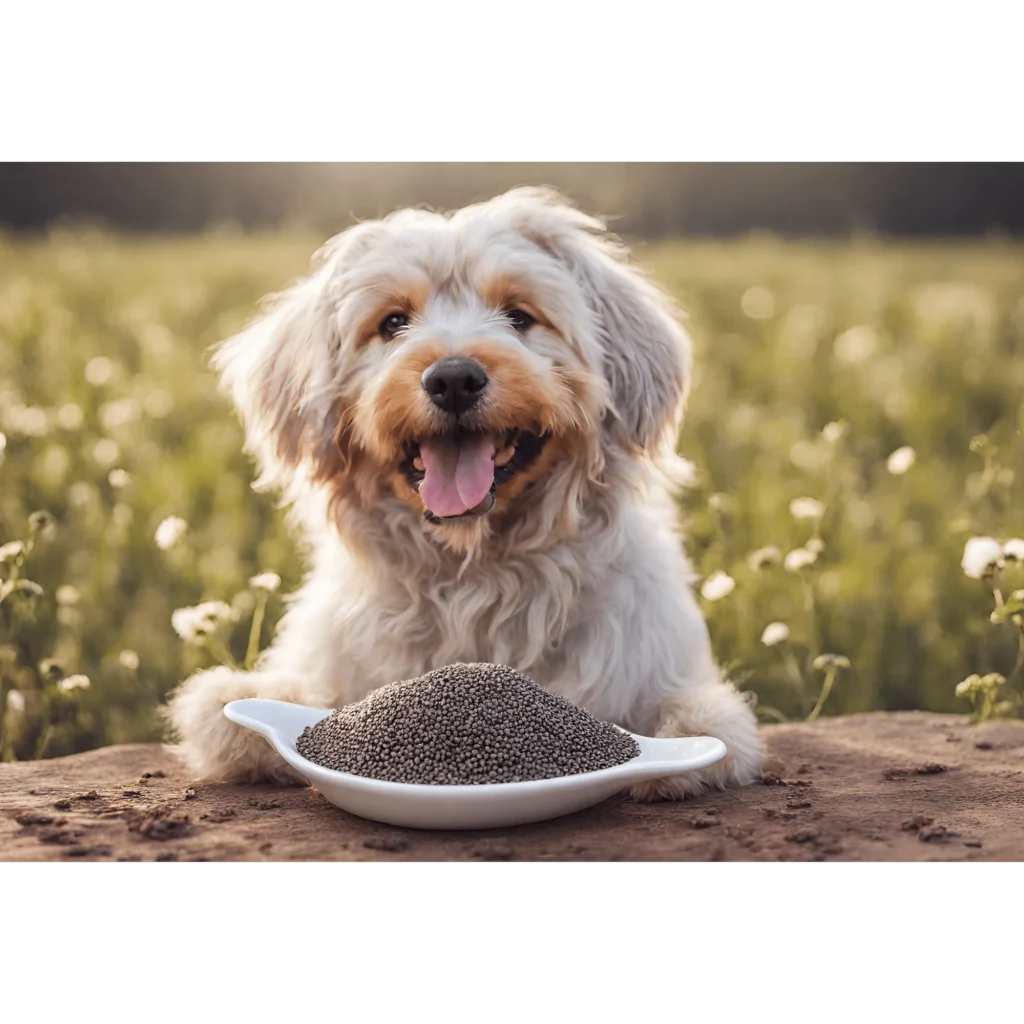
Chia seeds can offer some potential advantages for dogs when included in their diet in moderation. Here are a few perks:
1. Nutrient-Rich:
Chia seeds boast a range of nutrients that make them a healthy addition to your dog’s diet. Enhancing your dog’s meal with a sprinkle of chia seeds is a fantastic way to introduce extra nutrition.
These super-seeds are packed with several beneficial nutrients, including protein, vitamins (such as B vitamins), and minerals (such as calcium, potassium, magnesium, manganese, zinc, and phosphorus). Adding this wholesome touch can contribute to your dog’s overall well-being and nutritional balance.
2. High-Fiber Content:
Chia seeds are rich in soluble fiber, absorbing water and creating a gel-like substance. This can help regulate bowel movements and prevent constipation by adding bulk to the stool. Adequate fiber intake promotes a healthy digestive system in dogs.
The fiber in chia seeds can contribute to a feeling of fullness, potentially helping dogs maintain a healthy weight by reducing overeating. This can be particularly beneficial for overweight dogs or those prone to obesity. Soluble fiber can help regulate blood sugar levels by slowing down the absorption of sugars from the digestive tract. This can be beneficial, especially for dogs with diabetes or those at risk of developing the condition.
3. High Protein:
Chia seeds contain high levels of protein, which is essential for the maintenance and growth of muscles in dogs. Adequate protein intake supports the repair of tissues, helps build lean muscle mass, and ensures the proper functioning of organs.
Protein serves as an energy source for dogs. It is particularly important for active dogs, working dogs, or those engaging in regular physical activities. The protein in chia seeds can contribute to the energy requirements of dogs.
4. Omega-3 Fatty Acids:
Chia seeds are an excellent source of alpha-linolenic acid (ALA), which is a type of omega-3 fatty acid. Omega-3 fatty acids play a crucial role in maintaining healthy skin and promoting a shiny coat in dogs. They can help alleviate dry, itchy skin and reduce inflammation, contributing to a lustrous and well-conditioned coat.
Omega-3s have anti-inflammatory properties that can benefit dogs with arthritis or joint issues. They may help reduce joint pain and stiffness, improving overall mobility and comfort.
5. Rich in Antioxidants:
Chia seeds are known to be rich in antioxidants, and this can be a potential benefit for dogs. Antioxidants contribute to a strong immune system by helping the body defend against infections and diseases. A healthy immune system is important for a dog’s overall well-being.
While more research is needed, antioxidants are believed to play a role in preventing certain types of dog cancer. By neutralizing free radicals, antioxidants may help reduce the risk of cell mutations that can lead to cancer.
Are Chia Seeds Bad for Dogs?
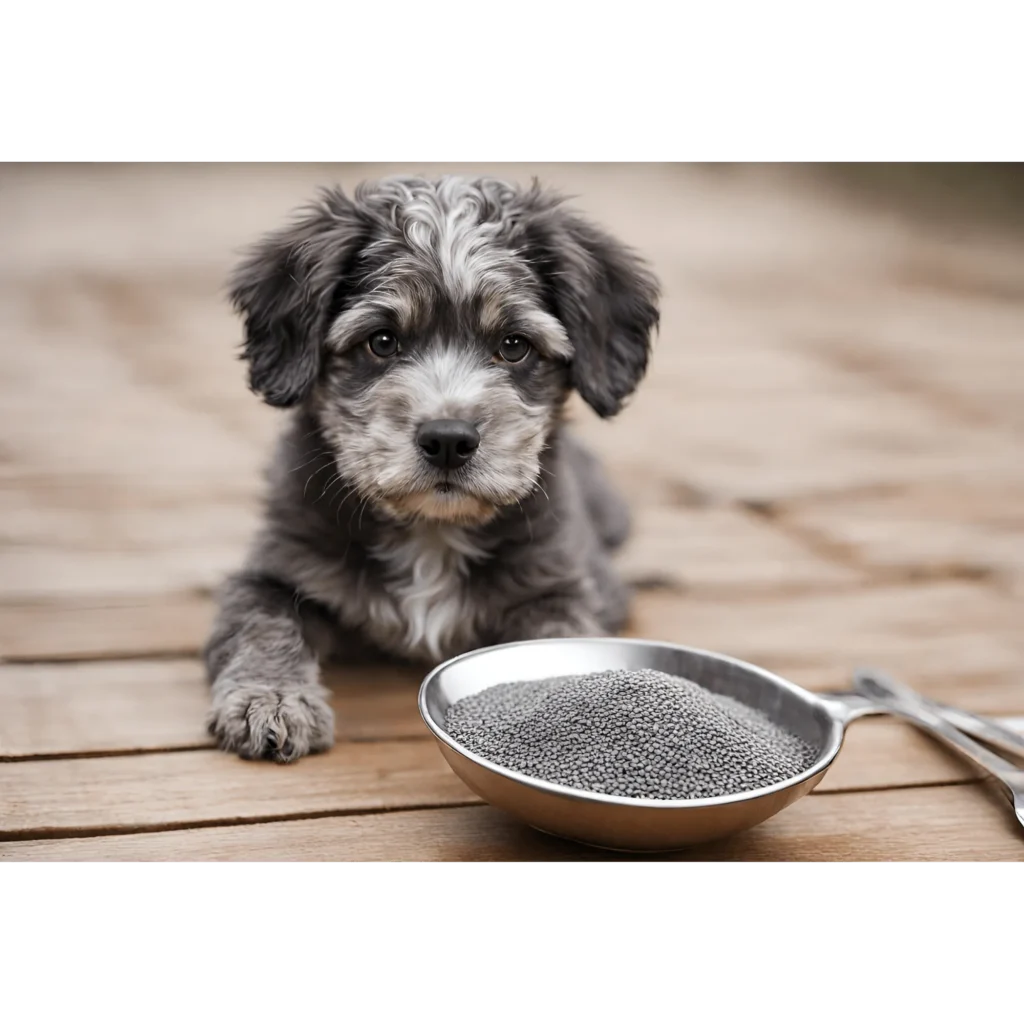
Salba chia is generally not considered bad for dogs when fed in moderation and with proper precautions. They can offer nutritional benefits such as omega-3 fatty acids, fiber, and various essential nutrients. However, there are some potential hazards and considerations to keep in mind:
1. Risk of Gastrointestinal Upset:
Chia seeds are high in dietary fiber, particularly soluble fiber. While fiber is generally beneficial for digestion, excessive amounts can cause gastrointestinal upset, including diarrhea or constipation.
Introduce chia seeds gradually, starting with a small amount and monitoring your dog’s response. If there are no adverse reactions, you can gradually increase the serving size.
2. Allergies and Sensitivities:
Dogs, like humans, can vary in their tolerance to specific foods. What may be well-tolerated by one dog could cause issues in another. It’s important to monitor your dog for any signs of discomfort or adverse reactions when introducing new foods.
Allergic reactions to food can manifest in various ways, including itching, redness, swelling, gastrointestinal upset (vomiting or diarrhea), respiratory issues, or behavioral changes. If you notice any of these symptoms after introducing chia seeds into your dog’s diet, it’s essential to consult with a veterinarian.
3. Intestinal Blockages:
Dry chia seeds have the remarkable ability to absorb over ten times their weight in water. However, serving them to your dog without proper preparation carries the risk of excess water absorption in the intestines, potentially leading to a partial or complete blockage.
To safeguard your pup from this dangerous condition, it’s crucial to always soak the chia seeds in water until they visibly swell in size before feeding them to your dog. This precaution ensures safer consumption and minimizes the risk of any gastrointestinal issues related to the expansion of dry chia seeds in the digestive tract.
4. Caloric Intake:
While chia seeds are a nutritious addition to a dog’s diet, it’s important to consider their caloric content, as excessive caloric intake can lead to weight gain and related health issues. Chia seeds are relatively high in calories due to their fat content, primarily from omega-3 fatty acids.
When adding chia seeds to your dog’s diet, it’s crucial to exercise portion control. Start with small amounts and monitor your dog’s weight and body condition. Adjust the serving size based on your dog’s individual needs and overall calorie requirements.
How Do You Safely Give Chia Seeds to Your Dog?
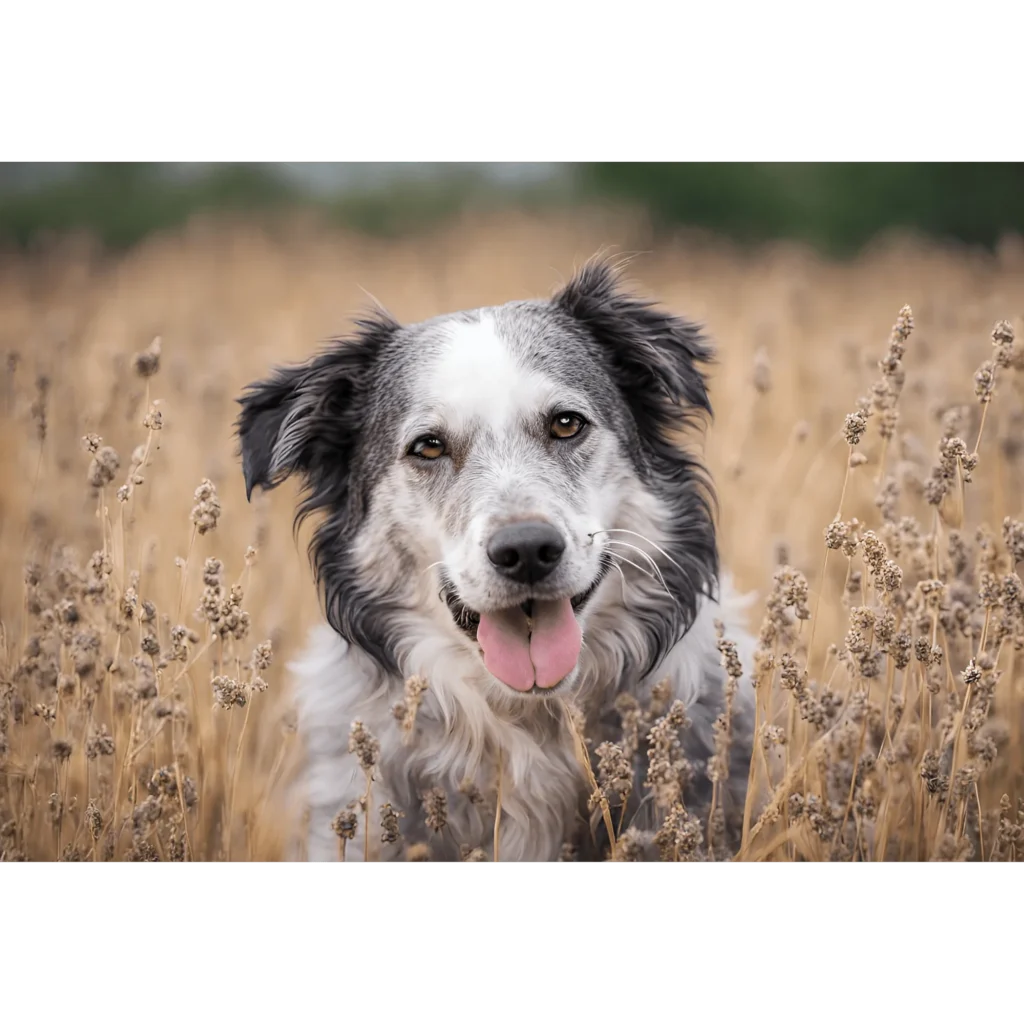
Before introducing any new food to your dog’s diet, especially if your dog has existing health issues or dietary restrictions, consult with your veterinarian. They can offer guidance tailored to your dog’s specific needs.
When incorporating chia seeds into your dog’s diet, it’s advisable to choose organic options that are free from harmful additives such as chemicals, pesticides, or artificial sweeteners. Opting for organic chia seeds ensures a purer and more natural source of this nutritious food, minimizing the potential exposure to harmful substances.
Start by introducing a very small amount of chia seeds into your dog’s diet. This allows you to monitor for any adverse reactions or gastrointestinal upsets. Before feeding chia seeds to your dog, soak them in water for at least 15-20 minutes or until they form a gel-like consistency. This helps prevent the seeds from expanding too much in your dog’s stomach and reduces the risk of choking or gastrointestinal blockage.
Mix the soaked chia seeds with your dog’s regular food, whether it’s kibble, wet food, or homemade meals. This ensures that your dog ingests them as part of a complete meal. Keep a close eye on your dog for any signs of allergic reactions or digestive issues after introducing chia seeds. If you notice any adverse reactions, discontinue feeding chia seeds and consult with your veterinarian.
Chia seeds should be part of a balanced and nutritionally complete diet for your dog.
Make sure that your dog’s overall diet is tailored to meet their specific nutritional needs.
Be mindful of the caloric content of chia seeds and adjust your dog’s overall daily caloric intake accordingly. Overfeeding chia seeds can contribute to excessive calorie consumption.
How Much Chia Seeds Can a Dog Have?
The amount of chia seeds that are safe for a dog can vary depending on the size, breed, and overall health of the dog. It’s important to introduce chia seeds gradually into your dog’s diet and monitor their response.
A general guideline for chia seed consumption is approximately ¼ teaspoon daily for every ten pounds of your dog’s weight. For instance, a 70-pound golden retriever would be given around 1 ¾ teaspoons of chia seeds. However, this is a rough estimate, and it’s crucial to consult with your veterinarian to determine the most appropriate and tailored dose for your specific dog.
Veterinarians can consider your dog’s health, dietary needs, and any existing conditions to provide the most accurate guidance on incorporating chia seeds into their diet.
Before Sharing with Your Pooch:
It’s necessary to recognize that certain human foods may cause adverse reactions in dogs. Always consult your veterinarian to determine whether it is safe to add specific foods, including chia seeds, to your pet’s diet.
This article serves educational and informational purposes, but it is not a substitute for professional medical or dietary advice tailored to your dog’s individual needs. Veterinarians can provide personalized guidance based on your dog’s health, potential allergies, and dietary requirements, ensuring the well-being and safety of your furry friend.
Final Thought:
In conclusion, chia seeds can be a nutritious addition to your dog’s diet when introduced responsibly and in moderation. These tiny seeds offer various health benefits, including providing omega-3 fatty acids, fiber, essential vitamins, minerals, and antioxidants. However, it’s crucial to approach their incorporation with caution and adhere to the recommended guidelines.
Before sharing chia seeds with your dog, consult with your veterinarian to ensure they align with your dog’s specific health needs. Gradually introduce chia seeds into your dog’s diet, starting with small amounts and monitoring for any adverse reactions. Soaking the seeds before feeding them helps prevent potential gastrointestinal issues.
While these Mexican chia can enhance your dog’s overall well-being, it’s essential to be mindful of potential risks, such as gastrointestinal upset, allergies, intestinal blockages, and excessive caloric intake. Maintaining portion control and considering your dog’s health conditions are key factors in safely incorporating chia seeds into their diet.
Always prioritize your dog’s safety and well-being, seeking professional veterinary advice when needed. This article aims to provide educational insights into the benefits and considerations of feeding chia seeds to dogs, but it should not replace personalized guidance from a qualified veterinarian. With proper care and attention, chia seeds can contribute to your dog’s overall health and vitality.
FAQs:
1: Are chia seeds safe for dogs?
Yes, chia seeds are generally safe for dogs when fed in moderation. They are a good source of omega-3 fatty acids, fiber, and other nutrients that can benefit your dog’s health.
2: What are the potential health benefits for dogs?
Chia seeds are loaded with omega-3 fatty acids, fiber, and antioxidants. They may contribute to improved skin and coat health, aid in digestion, and provide a nutrient boost for overall well-being.
3: Can I give chia seeds to puppies?
It’s best to wait until your puppy is on solid food before introducing chia seeds. Consult your veterinarian to determine the appropriate timing and quantity for your puppy’s unique needs.
4: Can dogs with kidney disease eat chia seeds?
Chia seeds can be a part of a dog’s diet with kidney disease, but it’s crucial to consult with your veterinarian for personalized advice based on your dog’s specific condition.
5: Can chia seeds be beneficial for dogs with cancer?
Chia seeds may provide some nutritional benefits for dogs with cancer due to their omega-3 fatty acids, antioxidants, and other nutrients. However, they should not be considered a sole treatment, and their use should be discussed with a veterinarian.






